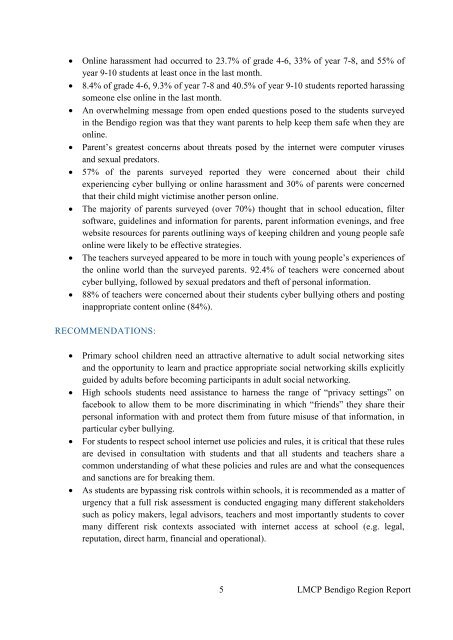LODDON MALLEE - Cyber Safe Kids
LODDON MALLEE - Cyber Safe Kids
LODDON MALLEE - Cyber Safe Kids
You also want an ePaper? Increase the reach of your titles
YUMPU automatically turns print PDFs into web optimized ePapers that Google loves.
Online harassment had occurred to 23.7% of grade 4-6, 33% of year 7-8, and 55% of<br />
year 9-10 students at least once in the last month.<br />
8.4% of grade 4-6, 9.3% of year 7-8 and 40.5% of year 9-10 students reported harassing<br />
someone else online in the last month.<br />
An overwhelming message from open ended questions posed to the students surveyed<br />
in the Bendigo region was that they want parents to help keep them safe when they are<br />
online.<br />
Parent‟s greatest concerns about threats posed by the internet were computer viruses<br />
and sexual predators.<br />
57% of the parents surveyed reported they were concerned about their child<br />
experiencing cyber bullying or online harassment and 30% of parents were concerned<br />
that their child might victimise another person online.<br />
The majority of parents surveyed (over 70%) thought that in school education, filter<br />
software, guidelines and information for parents, parent information evenings, and free<br />
website resources for parents outlining ways of keeping children and young people safe<br />
online were likely to be effective strategies.<br />
The teachers surveyed appeared to be more in touch with young people‟s experiences of<br />
the online world than the surveyed parents. 92.4% of teachers were concerned about<br />
cyber bullying, followed by sexual predators and theft of personal information.<br />
88% of teachers were concerned about their students cyber bullying others and posting<br />
inappropriate content online (84%).<br />
RECOMMENDATIONS:<br />
Primary school children need an attractive alternative to adult social networking sites<br />
and the opportunity to learn and practice appropriate social networking skills explicitly<br />
guided by adults before becoming participants in adult social networking.<br />
High schools students need assistance to harness the range of “privacy settings” on<br />
facebook to allow them to be more discriminating in which “friends” they share their<br />
personal information with and protect them from future misuse of that information, in<br />
particular cyber bullying.<br />
For students to respect school internet use policies and rules, it is critical that these rules<br />
are devised in consultation with students and that all students and teachers share a<br />
common understanding of what these policies and rules are and what the consequences<br />
and sanctions are for breaking them.<br />
As students are bypassing risk controls within schools, it is recommended as a matter of<br />
urgency that a full risk assessment is conducted engaging many different stakeholders<br />
such as policy makers, legal advisors, teachers and most importantly students to cover<br />
many different risk contexts associated with internet access at school (e.g. legal,<br />
reputation, direct harm, financial and operational).<br />
5 LMCP Bendigo Region Report


